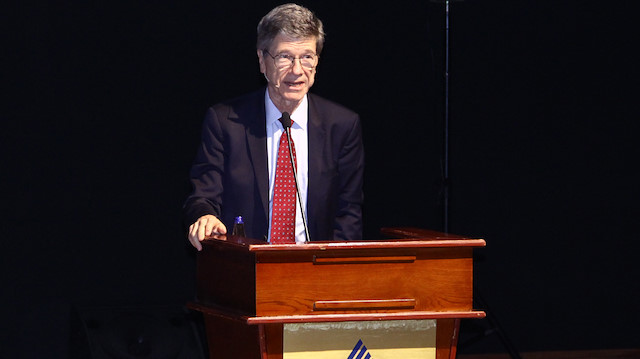
Economist Jeffrey Sachs stresses crucial need for sustainable development, hails Turkish first lady's zero waste initiative
A world-famous American economist urged a constructive way should be found for the sanction bill against Turkey in the U.S., saying “bearing down on Turkey is completely a misunderstanding.”
“The idea of bearing down on Turkey right now is, again, completely a misunderstanding compared to what we should be doing which is solving the region's problems,” Jeffrey Sachs, director of Columbia University Center for Sustainable Development, told TRT World in an exclusive interview.
During the interview Sachs talked about the U.S. decision to withdraw from Syria, formation of planned safe zone in northern Syria, as well as Turkey’s Zero Waste Project carried out under the auspices of Turkish President Recep Tayyip Erdogan and First Lady Emine Erdogan.
Addressing the economic situation in Turkey, he said: “I think about the fact that the U.S. has broken every export market of this country.”
Sachs pointed out that the war that broke out in Iraq did not only destroy a significant market for Turkey, but also resulted in flux of refugees in the country.
He said the same situation occurred when the U.S. carried out operation in the civil war-torn Syria.
“Iran is a major trading partner for Turkey. The U.S. puts on devastating sanctions by the way that the whole world disagrees with every country but the U.S. says, ‘by ourselves, we're going to put on sanctions and everyone else has to obey that’,” Sachs said.
When he recalled that the U.S. also declared a trade war with China which is another market for Turkey, he questioned: “So I say as an economist, are you kidding? How much pressure can you put on your ally?”
- Renewable energy
Sachs also said many powers flooded the oil-rich region.
“They were all trying to grab resources for decades at a time,” he said, adding that they would not care about the region otherwise.
“But oil actually also has to end because we have to move to wind, solar power, and renewable energy in the coming years,” he said.
Highlighting the urgent need to move to a zero carbon energy system, Sachs said otherwise the human being would kill itself through climate change.
“But the main message I think, for this region is, it's time for peace, it's time for technology improvement.
“It's time for ecological care for facing the water crisis, the sandstorm crisis, the pollution crisis in the region,” he said.
The economist added they could only be achieved in peace, not in war.
Stressing the crucial need for sustainable development, Sachs said Turkish First Lady Emine Erdogan’s zero waste initiative is one of the most important ones.
“We're really at the profound risk of our health and the destruction of nature,” he said, citing the large amount of pollution put into the waterways and onto the land.
“And so, the first lady has initiated a zero waste strategy for Turkey. She brought it to the United Nations [...],” Sachs said.
He said there is a lot of desire for global cooperation in the field and hailed the first lady’s leadership.
He also praised Turkey’s technical universities and engineers and said the country has got “the will to overcome this massive pollution and the environmental distress that is being caused.”
“I admire the leadership that's being shown,” Sachs said.
- Reconstruction of Syria
Turning to Syria crisis, he said, the ongoing war for eight years has been devastating for Syria, but a hardship for everybody.
Sachs said millions of people became refugees and added: “Turkey bears a very heavy burden of refugees, it is time for the fighting to end.”
“The war should be over because what Syria needs is rebuilding,” he said, and added, refugees “should and want to go home to a safe environment.”
According to Sachs, no mercenary soldiers paid by the U.S., Saudi Arabia or others should be present in the region and everybody should pull back to allow peace to take place.
“I hope Saudi Arabia or the Gulf countries in general could understand nothing is working if there's raging war going on in Syria or in Yemen,” he said.
“So in this sense, I believe that the region needs to take some action to say ‘end the wars, start the reconstruction, let the economy start to breed again’,” he added.
As part of his schedule in Turkey, Sachs also met Treasury and Finance Minister Berat Albayrak and discussed global trade and Turkey’s economic structure.
Sachs was listed twice among the Time magazine's 100 most influential world leaders and has received 28 honorary degrees.
The New York Time called Sachs “probably the most important economist in the world,” and Time called him “the world’s best-known economist.”
A survey by The Economist also ranked Sachs among three most influential living economists.


